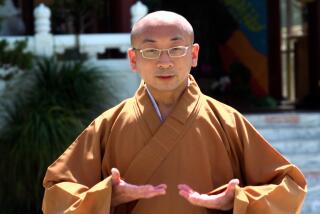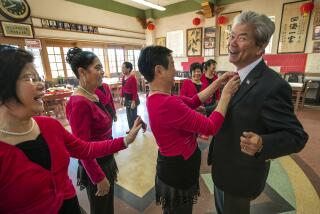In Ching Hai, Clinton Finds New Type of Special Interest
She looks like a combination of Imelda Marcos and silent film vamp Theda Bara, has tens of thousands of disciples worldwide--including many in Southern California--and raises money through her own clothing, jewelry and dinnerware lines as well as a global string of vegetarian restaurants.
Supreme Master Ching Hai, leader of a Buddhist-inspired movement that made massive contributions to President Clinton’s legal defense fund, gives new meaning to the term special interest.
The group--Suma Ching Hai International Assn.--is already under investigation by authorities in its home country of Taiwan. An announcement this week that contributions from members of the group were returned or refused by Clinton defense fund officials raises another question about the mysterious sect: Why did a group concerned with spiritual enlightenment plunge into Clinton’s earthly legal troubles?
The answer to that question may prove as elusive as the Supreme Master herself.
Though based in Taiwan, Ching Hai’s whereabouts are unknown even to her supporters, who claim to have chapters in 50 countries.
“We don’t know where she is, she’s traveling all the time. She tells us when she’s coming,” said Thomas Tung Ngo, the Los Angeles contact for the Ching Hai sect.
The group’s Internet Web site says that Ching Hai has no permanent residence, but when in Hong Kong stays in a cave formed out of the ruins of a cattle shed. “It looks like a fairy’s cave,” the Web site reports.
Not only are the Supreme Master’s whereabouts unknown, Ngo said he doesn’t even know how many members the group has. “Probably about 100,000” worldwide, he guessed. “We don’t keep track.” Ngo estimated the Southern California membership to be about 3,000, most of them refugees from Vietnam.
The president’s defense fund --set up in 1994 to help cover the president or first lady’s legal bills stemming from probes into the Whitewater real estate development and other matters--returned more than $600,000 in donations Monday. Much of the returned money came from members of the Ching Hai group, although the exact amount from the group was not disclosed.
The donations had been delivered to the fund at various times since March by Yah Lin “Charlie” Trie, a former Little Rock restaurant owner and longtime friend of Clinton.
Fund officials said they returned the money after an internal investigation raised questions about whether all the contributors used their own cash. Some of their donations were in sequentially numbered money orders but from people in different cities.
In addition, the defense fund’s investigators were concerned that much of the money was raised at Ching Hai meetings. Under the fund’s own rules, contributions must be made voluntarily by individuals, using their own personal funds, and no greater than $1,000 a year.
Ngo said Thursday that U.S. members of the group were prompted to donate money to the fund by messages on the sect’s Web site. Ngo said that some of the money may have been collected at group meetings, but said he couldn’t remember.
Meditation is central to the sect’s activities, and Ngo said that the intensity of their sessions sometimes affects members’ memory. “When we practice meditation, sometimes we forget everything,” he explained in a telephone interview.
Ngo said that he and other members who are immigrants felt they ought to help Clinton simply because as president, he symbolizes the country that took them in. “We were helped by this country so much, giving $500 or $1,000 is nothing in comparison to what we received,” Ngo said.
Other members have said that the master may have encouraged contributions by expressing sympathy for Clinton in speeches.
In an Oct. 29, 1994, speech, the transcript of which is available on the group’s Internet site, Ching Hai praises Clinton for lifting the U.S. trade embargo with Vietnam, and calls him “The best president for the United States, at the moment.”
Discussing allegations of sexual misconduct by Clinton, Ching Hai observed: “Maybe he’s too handsome and many women like him. Sometimes when a woman likes a man and a man rejects her, she will cause trouble.”
She did not make a direct solicitation of funds in the speech, but did tell her followers that Clinton “needs a lot of lawyers,” and “we have plenty we can offer to him.”
David Lane, a philosophy professor at Mount San Antonio College who has studied Ching Hai, alleges that her donations to Clinton and charitable work in the U.S. is meant to enhance her credibility in Taiwan. Groups like hers “are especially looked down upon in Taiwan. Any connection she can make with the U.S., the most powerful country in the world, boosts her image among people there,” he said.
The Ching Hai sect has been under investigation by Taiwan’s Ministry of Interior since October, when authorities began looking into the group’s financial records as part of a general crackdown on religious cults on the island.
Although Ching Hai’s daily whereabouts are seldom known, she and her followers appear in droves at natural disasters.
Volunteers from her organization were on hand at the great Midwestern floods in 1993, and the group claims to have donated $170,000 to flood-relief efforts.
The organization’s recruiting literature and Web site points out that governors of six Midwestern states proclaimed Feb. 22, 1994, “Supreme Master Ching Hai Day,” and that congratulatory messages were sent to the group from Presidents Reagan, Bush and Clinton.
According to an account on the Web site, Clinton sent the group a telegram calling Ching Hai “a paragon of love and peace in the world.”
The group’s publications are filled with letters from government officials, many of them thanking the group for donations, and photographs of Ching Hai with various officials.
A recent issue of the sect’s magazine featured a spread of photographs of Ching Hai with Hun Sen, Cambodia’s second prime minister and military leader.
In Southern California, the Ching Hai group last year made $100,000 donations to two hospitals, the West Los Angeles Veterans Affairs Medical Center and the Jerry L. Pettis Veterans Affairs Medical Center in Loma Linda.
Los Angeles member Ngo said that much of the sect’s funds come from sales of the master’s clothing, jewelry and paintings. At a London fashion show last year, Ching Hai’s often revealing designer clothing was priced from about $1,000 to more than $10,000, according to the Independent newspaper.
The sect’s literature claims the group is not a religion, but a Buddhist-inspired meditation organization. It says Ching Hai was born in Vietnam and moved to Germany after marrying a German scientist. After becoming a disciple of a Himalayan Buddhist master, she left her husband with his consent to “seek the perfect method for liberation.”
More to Read
Sign up for Essential California
The most important California stories and recommendations in your inbox every morning.
You may occasionally receive promotional content from the Los Angeles Times.









